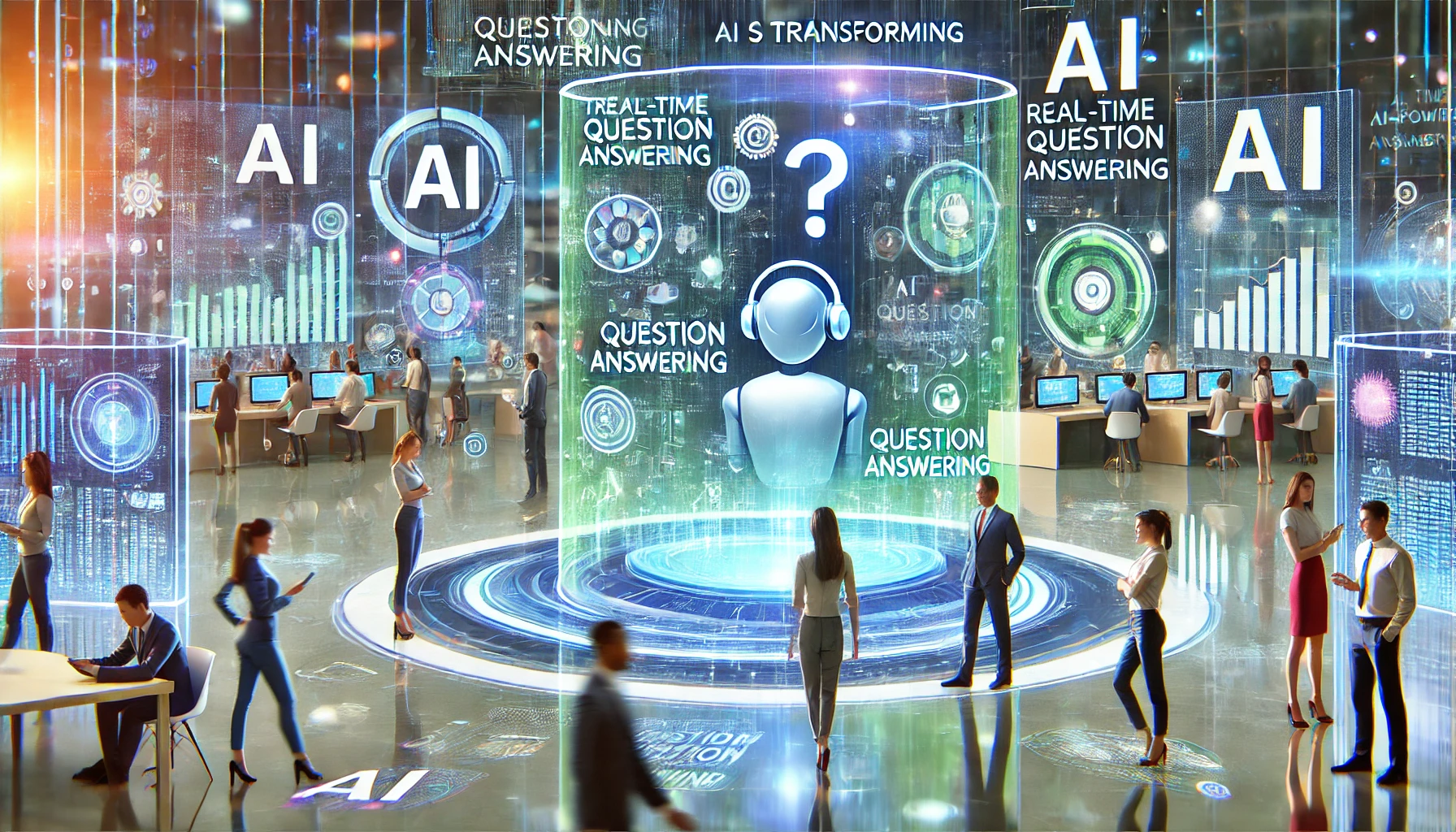
Introduction
In today’s fast-paced world, how we seek information has radically transformed. Gone are the days when finding answers meant flipping through encyclopedias or spending hours on internet searches. Artificial intelligence (AI) is stepping up to answer our questions instantly and accurately. From everyday queries about the weather to complex technical support issues, AI answer generators are quickly becoming essential in our digital lives.
The challenge with traditional information retrieval methods is that they can be time-consuming and often lead to incomplete or inaccurate results. We’ve all experienced the frustration of sifting through pages of search engine results, trying to find the exact answer we need. AI answer generators solve this problem by providing precise, contextually relevant responses in seconds. They use advanced technologies like natural language processing (NLP) and machine learning to understand questions and deliver responses that feel almost human.
In this article, you will learn how AI answer generators work, their benefits to various sectors, and their challenges. We’ll explore real-world applications, highlight ethical considerations, and look at how AI is poised to change how we find answers forever.
What is an AI Answer Generator?
AI answer generators are advanced systems that use artificial intelligence to respond to questions posed by users. Unlike traditional search engines, which return a list of links, AI answer generators aim to provide direct, conversational responses. These systems rely on complex algorithms, vast datasets, and continuous learning to improve their ability to understand and answer a wide range of questions.
At their core, AI answer generators utilise natural language processing (NLP) techniques, a branch of AI that focuses on the interaction between computers and human language. NLP allows these systems to comprehend questions in a way that mimics human understanding, analysing the context, syntax, and semantics to generate relevant answers. Machine learning models, such as transformers, enable these systems to predict and generate responses by learning from vast amounts of data.
Popular models include OpenAI’s GPT-4, Google’s BERT, and other advanced AI technologies that have set the standard for question-answering capabilities. These models have been trained on diverse data sources, including books, websites, and articles, allowing them to draw on a wealth of knowledge when generating answers.
AI answer generators are used in various applications, from virtual assistants like Siri and Alexa to more sophisticated customer service bots that can handle complex queries. As these systems evolve, their ability to understand nuance and context continues to improve, making them increasingly effective tools for finding information.
How AI Answer Generators Work
The operation of AI answer generators can be broken down into several key steps:
- Question Parsing: When a question is posed, the system first analyses the input to understand the context and intent behind the query. This involves breaking down the question into parts and identifying keywords, phrases, and context clues that help determine the information being sought.
- Data Retrieval: Once the system understands the question, it searches its database or external sources for relevant information. This step involves complex algorithms that rank and filter potential answers based on relevance and accuracy.
- Answer Generation: Using machine learning models, the system generates a response that is accurate and contextually appropriate. This process is heavily influenced by training data and the continuous learning mechanisms that refine the model’s understanding over time.
- Response Delivery: Finally, the AI presents the answer in a clear and conversational format. In some systems, responses are tailored to match the user’s style, preferences, or past interactions, enhancing the overall user experience.
One of the most remarkable aspects of AI answer generators is their ability to learn from each interaction. This continuous learning loop allows the AI to become more accurate and responsive over time, adapting to new information and refining its answers based on user feedback.
Real-world examples include chatbots used in customer service that can handle everything from product inquiries to troubleshooting issues. Virtual assistants like Google Assistant and Microsoft’s Cortana also use AI answer generators to provide quick, reliable answers to user questions.
Benefits of Using AI Answer Generators
AI answer generators offer a range of benefits that make them highly valuable across different sectors:
- Improved Efficiency: AI answer generators provide immediate responses to questions, significantly reducing the time it takes to find information. Whether it’s a quick query about a company’s product or a more complex question about a technical issue, AI systems can handle it in seconds.
- Scalability: Unlike human agents, AI can manage millions of queries simultaneously without compromising speed or accuracy. This makes it an invaluable tool for businesses needing to handle high customer inquiries or provide round-the-clock support.
- Personalisation: AI answer generators can be programmed to learn from user interactions, providing personalised responses based on previous queries, user behaviour, and preferences. This personal touch enhances the user experience and can help build stronger customer relationships.
- Cost Savings: By automating the question-answering process, businesses can reduce their reliance on human staff, lowering operational costs while maintaining high customer service levels.
- Accessibility: AI systems can assist users with disabilities by providing voice-activated responses, helping those with visual impairments or other challenges access information more easily.
- Consistency: Unlike human agents, AI answer generators provide consistent answers every time, ensuring that users receive accurate and reliable information no matter when they ask.
For more on the benefits of AI in customer service, check out this article on AI-driven customer support.
Challenges and Limitations
While AI answer generators offer many advantages, they are not without their challenges and limitations:
- Accuracy Issues: AI answer generators can sometimes misunderstand questions or provide incorrect answers despite significant advancements. This can be due to limitations in the training data or the inability of the AI to grasp the nuances of human language fully.
- Bias in Data: AI systems are only as good as the data on which they are trained. If the training data contains biases, the AI will likely reflect them in its answers. This can lead to skewed or unfair responses, particularly in sensitive areas like healthcare or legal advice.
- Ethical Considerations: The use of AI in decision-making raises important ethical questions, especially regarding privacy, consent, and the potential misuse of AI-generated information. Ensuring that AI systems are transparent and accountable is a key challenge that developers and policymakers must address.
- Dependence on Data Quality: High-quality, up-to-date data is essential for accurate responses. Outdated or incorrect information can lead to misleading answers, particularly problematic in areas like medical advice or financial guidance.
- Lack of Emotional Intelligence: Unlike human agents, AI cannot understand emotions fully, which can result in responses that feel cold or impersonal. This limitation can be a drawback in customer service situations where empathy and emotional understanding are important.
- Technical Limitations: AI systems require significant computational power and resources to function effectively. Smaller businesses may find it challenging to implement these technologies due to the costs involved.
For an in-depth discussion on the ethical implications of AI, visit this guide on AI ethics and responsible AI.
Applications of AI Answer Generators in Different Sectors
The versatility of AI answer generators means they can be applied across various industries, providing valuable support and enhancing user experiences.
- Education: AI answer generators are used in educational platforms to assist students with homework, research, and personalised learning. They answer common questions instantly, helping students understand complex topics more easily.
- Healthcare: In healthcare, AI answer generators can provide patients with information about symptoms, treatments, and medications. While they do not replace professional medical advice, they serve as a valuable first point of contact for many individuals seeking health-related information. For more on AI’s impact on healthcare, see this case study on AI in healthcare.
- Business: Many companies use AI chatbots and virtual assistants to handle customer service inquiries, reducing the workload on human staff and providing 24/7 support. These AI systems can answer questions about products, services, shipping, and more, improving customer satisfaction.
- E-commerce: Online retailers utilise AI answer generators to help customers with product recommendations, order tracking, and returns processes. Businesses can streamline their operations and enhance the shopping experience by automating these interactions.
- Finance: In the finance sector, AI-powered systems assist users with account inquiries, transaction details, and investment advice. They help customers navigate complex financial information with ease.
Conclusion
AI answer generators are revolutionising how we access information, offering a faster, more efficient alternative to traditional search methods. By leveraging advanced AI technologies like NLP and machine learning, these systems can understand and respond to questions in ways that feel almost human. While challenges like data bias and ethical concerns remain, the potential of AI to enhance various sectors—from education and healthcare to business and finance—is undeniable.
As AI continues to evolve, we can expect these systems to become even more accurate, versatile, and essential in our daily lives. For businesses, educators, healthcare providers, and individuals alike, AI answer generators represent a powerful tool that can save time, reduce costs, and improve the quality of information at our fingertips.
Embrace the future of AI-driven answers, and discover how these tools can transform your personal and professional life. Explore the latest AI answer generators and experience the benefits of instant, accurate information today.


Your point of view caught my eye and was very interesting. Thanks. I have a question for you.